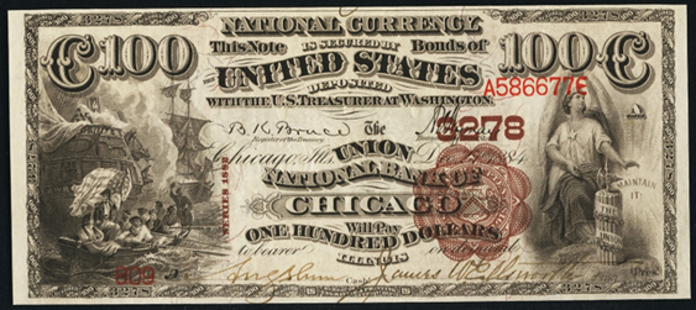One Hundred Dollar Notes › Nationals › 1882 One Hundred Dollar National Bank Notes › Iowa Charters › 1882 $100 Greenfield Iowa First National Bank
Get Value Now
| Item | Info |
|---|---|
| Series | 1882 |
| Charter | #5334 First National Bank of Greenfield, Iowa |
| Year Chartered | 1900, 422 Banks Chartered |
| City Info | Greenfield is a city and county seat of Adair County, United States. As of the 2010 census, the city population was 1,982. The area around Greenfield was settled in 1854. The plan for the town of Greenfield was created in 1856 when the land was purchased by Milton C. Munger. Munger is responsible for the design of Greenfield’s unique Lancaster-style town square, and the city park located at Grant and NE Second Street was also included in the original plat. Greenfield is named from Greenfield, Massachusetts. Greenfield became the county seat in 1875, after battling out nearby Fontanelle for the title. The city was incorporated on May 22, 1876. Source: Wikipedia |
| Similar Cities | If your note doesn't match try: 1. Greenfield, Ohio - First National Bank 2. Greenfield, Massachusetts - First National Bank 3. Greenfield, Massachusetts - Franklin County National Bank 4. Greenfield, Massachusetts - Packard National Bank |
| Seal Varieties | Brown, Blue |
| See Also | If your note doesn't match try: 1. 1882 $100 Gold Certificate 2. 1878 $100 Legal Tender 3. 1880 $100 Legal Tender |
| Other Info | 1. Value depends on notes known for charter, condition and market demand. 2. Rare and highly desirable National Note. |
| Neat Fact | First series printed entirely at Bureau of Engraving and Printing, Washington, D.C. Previous issues printed in New York only, then partly in New York and Washington (Friedbergs, 20th Ed. P 99) |
No Obligations Offers and Appraisals
Please submit a good photo or scan. It will be identified and evaluated. Understand there may be subtle differences between the image you see above and your note. Signatures, design, markings and note condition will determine the offer price. Notes in Uncirculated or better condition receive the best offers.
Appraisals can be estimated for wholesale and retail prices. Wholesale is what dealers typically pay. Retail is what a collector might pay. Retail is slightly higher in most cases.
Please visit this page for USA Paper Money Reference. Do not treat this page as a reference guide, it is for appraisal and acquisition purposes only.
